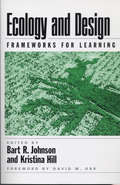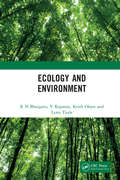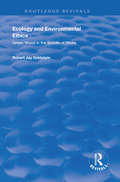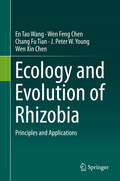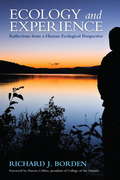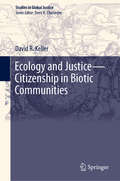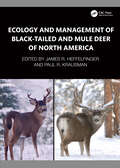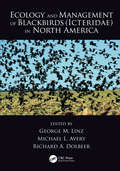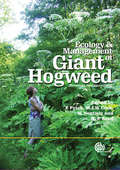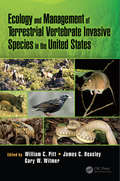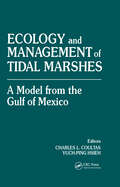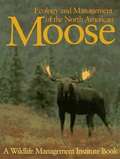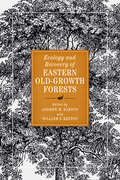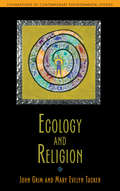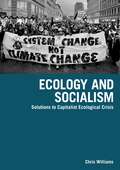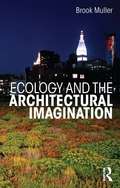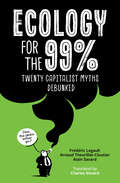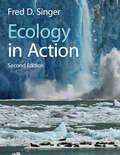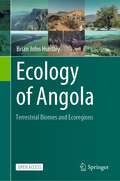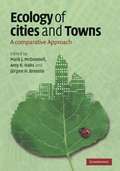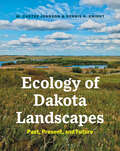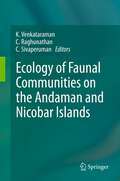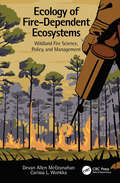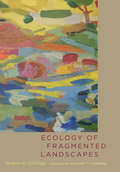- Table View
- List View
Ecology and Design: Frameworks For Learning
by Kristina Hill Robert Melnick Bart JohnsonProfessionals, faculty, and students are aware of the pressing need to integrate ecological principles into environmental design and planning education, but few materials exist to facilitate that development.Ecology and Design addresses that shortcoming by articulating priorities and approaches for incorporating ecological principles in the teaching of landscape design and planning. The book explains why landscape architecture and design and planning faculty should include ecology as a standard part of their courses and curricula, provides insights on how that can be done, and offers models from successful programs. The book: examines the need for change in the education and practice of landscape architecture and in the physical planning and design professions as a whole asks what designers and physical planners need to know about ecology and what applied ecologists can learn from design and planning develops conceptual frameworks needed to realize an ecologically based approach to design and planning offers recommendations for the integration of ecology within a landscape architecture curriculum, as an example for other design fields such as civil engineering and architecture considers the implications for professional practice explores innovative approaches to collaboration among designers and ecologistsIn addition to the editors, contributors include Carolyn Adams, Jack Ahern, Richard T. T. Forman, Michael Hough, James Karr, Joan Iverson Nassauer, David Orr, Kathy Poole, H. Ronald Pulliam, Anne Whiston Spirn, Sandra Steingraber, Carl Steinitz, Ken Tamminga, and William Wenk. Ecology and Design represents an important guidepost and source of ideas for faculty, students, and professionals in landscape architecture, urban design, planning and architecture, landscape ecology, conservation biology and restoration ecology, civil and environmental engineering, and related fields.
Ecology and Environment
by R N Bhargava V Rajaram Keith Olson Lynn TiedeThe alarming rise in greenhouse gas and pollution level which has resulted in serious environmental and ecological harm is the biggest concern today. It has not only made the lives of mankind miserable but also threatens their very existence. Ecology and Environment has delved in depth on the subject and brings a broad perspective of the various issues. Following the curriculum of University Grants Commission, the book covers different types of ecosystem on the earth. It deals with the effective and sustainable use of natural resources which includes water, forest, mineral resources in the ground and productive land. The book explains the population trends in the world and India, and how it is impacting the environment. The role of public participation in promoting environmental sustainability is explored too. Please note: This volume is Co-published with The Energy and Resources Institute Press, New Delhi. Taylor & Francis does not sell or distribute the Hardback in India, Pakistan, Nepal, Bhutan, Bangladesh and Sri Lanka
Ecology and Environmental Ethics: Green Wood in the Bundle of Sticks (Routledge Revivals)
by Robert Jay GoldsteinOriginally published in 2004. Examining the successes and failures of three decades of environmental law, this absorbing book reconsiders some of the policies devised to remedy centuries of abuse of the planet. It acknowledges the advances made using technological standards to effect pollution control as well as rudimentary systems that regulate use of land at the local level. However, as the author observes, these systems have limitations in solving vexing problems such as sprawl and non-point source pollution, as the cost of their use can easily outweigh the benefits. He suggests a system, termed 'Green Wood in the Bundle of Sticks', that provides the necessary theoretical and historical bases to bridge the gap between the potentials of each system. Using objective criteria based on science, this system is tied to a land ownership system that also takes into account societal concerns at a broader level.
Ecology and Evolution of Rhizobia: Principles and Applications
by En Tao Wang Wen Feng Chen Chang Fu Tian Wen Xin Chen J. Peter YoungThis book reviews the history and development of rhizobial ecology (diversity, function and interactions with the biotic and abiotic environments), evolution (genome diversification, systematics of symbiotic genes) and application. Further, it describes the new concept of rhizobia, the latest systematic methods, biogeographic study methods, and genomic studies to identify the interactions between rhizobia, legumes and environments. To enable readers to gain a comprehensive understanding of rhizobial biogeography, the book provides effective protocols for the selection and application of high-efficiency rhizobial inoculants. In addition, it presents standard and modern methods used in studies on rhizobial ecology and evolution in dedicated appendices, making it a unique and valuable handbook for researchers.
Ecology and Experience
by Richard J. Borden Darron CollinsA philosophical and narrative memoir, Ecology and Experience is a thoughtful, engaging recounting of author Richard J. Borden's life entwined in an overview of the intellectual and institutional history of human ecology--a story of life wrapped in a life story. Borden shows that attempts to bridge the mental and environmental arenas are uncertain, but that rigid conventions and narrow views have their dangers too. Human experience and the natural world exist on many levels and gathering from both realms gives rise to novel constellations. In a blend of themes and approaches based on a lifetime of interdisciplinary inquiry, the author wanders these intersections and invites us to exercise our capacities for ecological insight, to deepen the experience of being alive, and, most of all, to more fully enrich our lives.ContentsForeword by Darron Collins, president of the College of the AtlanticPrefacePart I. Transects and Plots1. The Arc of Life2. Ecology3. Experience4. Human Ecology5. EducationPart II. Facets of Life6. Time and Space7. Death in Life8. Personal Ecology9. Context10. Metaphor and MeaningPart III. Wider Points of View11. Kinds of Minds12. Insight13. Imagination14. Keyholes15. Ecology and Identity16. The Unfinished CoursePart IV. CodaFrom the Trade Paperback edition.
Ecology and Justice—Citizenship in Biotic Communities (Studies in Global Justice #19)
by David R. KellerThis is the first book to outline a basic philosophy of ecology using the standard categories of academic philosophy: metaphysics, axiology, epistemology, aesthetics, ethics, and political philosophy. The problems of global justice invariably involve ecological factors. Yet the science of ecology is itself imbued with philosophical questions. Therefore, studies in ecological justice, the sub-discipline of global justice that relates to the interaction of human and natural systems, should be preceded by the study of the philosophy of ecology. This book enables the reader to access a philosophy of ecology and shows how this philosophy is inherently normative and provides tools for securing ecological justice. The moral philosophy of ecology directly addresses the root cause of ecological and environmental injustice: the violation of fundamental human rights caused by the inequitable distribution of the benefits (economies) and costs (diseconomies) of industrialism. Philosophy of ecology thus has implications for human rights, pollution, poverty, unequal access to resources, sustainability, consumerism, land use, biodiversity, industrialization, energy policy, and other issues of social and global justice. This book offers an historical and interdisciplinary exegesis. The analysis is situated in the context of the Western intellectual tradition, and includes great thinkers in the history of ecological thinking in the West from the natural sciences, social sciences and humanities. Keller asks the big questions and surveys answers with remarkable detail. Here is an insightful analysis of contemporary, classical, and ancient thought, alike in the ecological sciences, the humanities, and economics, the roots and fruits of our concepts of nature and of being in the world. Keller is unexcelled in bridging the is/ought gap, bridging nature and culture, and in celebrating the richness of life, its pattern, process, and creativity on our wonderland Earth. Holmes Rolston, III University Distinguished Professor, Colorado State UniversityAuthor of A New Environmental Ethics: The Next Millennium for Life on Earth (2012) Mentored by renowned ecologist Frank Golley and renowned philosopher Frederick Ferré, David Keller is well prepared to provide a deep history and a sweeping synthesis of the "idea of ecology"—including the metaphysical, epistemological, and ethical aspects of that idea, as well as the scientific. J. Baird Callicott University Distinguished Research Professor, University of North TexasAuthor of Thinking Like a Planet: The Land Ethic and the Earth Ethic (2013)
Ecology and Management of Black-tailed and Mule Deer of North America
by James R. Heffelfinger and Paul R. KrausmanBlack-tailed and mule deer represent one of the largest distributions of mammals in North America and are symbols of the wide-open American West. Each chapter in this book was authored by the world’s leading experts on that topic. Both editors, James R. Heffelfinger and Paul R. Krausman, are widely published in the popular and scientific press and recipients of the O. C. Wallmo Award, given every two years to a leading black-tailed and mule deer expert who has made significant contributions to the conservation of this species. In addition, Heffelfinger has chaired the Mule Deer Working Group sponsored by the Western Association of Fish and Wildlife Agencies for more than 15 years. This working group consists of the leading black-tailed and mule deer experts from each of 24 states, provinces, and territories in western North America, putting them at the forefront of all conservation and much of the research on this species. The book represents all current knowledge available on these deer, including how changing conditions such as fires, habitat alteration and loss, disease, climate change, socio-economic forces, energy development, and other aspects are influencing their distribution and abundance now and into the future. It takes a completely fresh look at all chapter topics. The revisions of distribution, taxonomy, evolution, behavior, and new and exciting work being done in deer nutrition, migration and movements, diseases, predation, and human dimensions are all assembled in this volume. This book will instantly become the foundation for the latest information and management strategies to be implemented on the ground by practitioners and to inform the public. Although this book is about deer, the topics discussed influence most terrestrial wildlife worldwide, and the basic concepts in many of the chapters are applicable to other species.
Ecology and Management of Blackbirds (Icteridae) in North America
by George M. Linz Michael L. Avery Richard A. DolbeerShortlisted for the 2018 TWS Wildlife Publication Awards in the edited book category The various species of new world blackbirds, often intermingled in large foraging flocks and nighttime roosts, collectively number in the hundreds of millions and are a dominant component of the natural and agricultural avifauna in North America today. Because of their abundance, conspicuous flocking behavior, and feeding habits, these species have often been in conflict with human endeavors. The pioneering publications on blackbirds were by F. E. L. Beal in 1900 and A. A. Allen in 1914. These seminal treatises laid the foundation for more than 1,000 descriptive and experimental studies on the life histories of blackbirds as well as their ecology and management in relation to agricultural damage and other conflicts such as caused by large winter roosting congregations. The wealth of information generated in over a century of research is found in disparate outlets that include government reports, conference proceedings, peer-reviewed journals, monographs, and books. For the first time, Ecology and Management of Blackbirds (Icteridae) in North America summarizes and synthesizes this vast body of information on the biology and life histories of blackbirds and their conflicts with humans into a single volume for researchers, wildlife managers, agriculturists, disease biologists, ornithologists, policy makers, and the public. The book reviews the life histories of red-winged blackbirds, yellow-headed blackbirds, common grackles, and brown-headed cowbirds. It provides in-depth coverage of the functional roles of blackbirds in natural and agricultural ecosystems. In doing so, this authoritative reference promotes the development of improved science-based, integrated management strategies to address conflicts when resolutions are needed.
Ecology and Management of Giant Hogweed
by P. Pysek M. J. W. Cock W. Nentwig H. P. RavnThis book is an authoritative compendium of current knowledge on this amazing invasive plant and will facilitate improved management. It is an invaluable resource for both practitioner and student, and covers topics including taxonomy, genetics, reproduction, population ecology, and invasion dynamics.
Ecology and Management of Terrestrial Vertebrate Invasive Species in the United States
by William C. Pitt James Beasley Gary W. WitmerVertebrate invasive species are important ecologically, socially, and scientifically throughout much of the globe. However, the interdiction and options for management of invasive species are driven by localized regulation at the country or even state level and thus the management of species must be framed within that context. This book is focused around the management of invasive vertebrate species in the United States, although readers will find much of the material broadly applicable to invasive species in other regions. Vertebrate invasive species cause damage to agriculture, property, natural resources, and threaten human health and safety. However, most of these species occur in the United States resulting from human-mediated activities, often being released intentionally. For the first time, the wealth of scientific information about vertebrate invasive species in the United States is summarized and synthesized in a single volume to be easily accessible to ecologists and natural resource managers. With a focus on prominent terrestrial invasive species that have a history of policy and management and highlighting contemporary issues and management, this book consists of 18 chapters written by experts from across the United States. The first section of the book focuses on overarching policy and management topics associated with vertebrate invasive species; including biosecurity threats and risk assessment, policy and regulation, and the economics of their management. The second section provides in-depth reviews of noteworthy invasive mammals, birds, amphibians, and reptiles. After finishing this book, the reader should understand the complexity of managing invasive species, the unique challenges that each new species may present, and the steps forward that may decrease the impact of these species on the environment, human health, and the economy.
Ecology and Management of Tidal MarshesA Model from the Gulf of Mexico
by Charles L. CoultasThis is a major compendium of the existing knowledge of the ecology and management of tidal marshes by some of the leading experts in the field. The major theme of the book is the interconnectedness of the marsh, plants, marine organisms, soils and geology, energy and money flow, and legal and management effects on the system.Emphasis is placed throughout on the fact that nature has provided a free service that can either be maintained and enhanced by man or destroyed and forever lost. At a time of declining fisheries, this book points the way to management strategies that are needed to effect improvement.
Ecology and Management of the North American Moose (Zoo & Aquarium Biology & Conservation)
by Charles Schwartz Albert FranzmannThe largest of all living deer, moose in North America range across a broad band of forest and glade that extends from Newfoundland to the Rocky Mountains, into Alaska, and as far south as Colorado. Prized by Native Americans and incorporated into their cultures, moose also were hunted by successive waves of European settlers. Nearly eradicated by the turn of the century, the continent-wide population has rebounded to an estimated one million, and the moose has become a ubiquitous symbol of the untrammeled northern wilderness. <p><P> The most comprehensive book ever published on the North American moose, this abundantly illustrated volume fully explains moose biology and ecology and assesses the increasingly complex enterprise of managing the species. Twenty-one wildlife biologists and researchers discuss moose taxonomy, reproduction and growth, feeding habits, behavior, population dynamics, relationships with predators, incidental mortality, and seasonal migration patterns. They analyze the effect of new strategies of moose habitat and harvest management--including the planting of late-winter cover, hunting regulations, and aerial and ground-level tracking methods. They also describe immobilization, handling, and translocation practices and discuss the future of moose management. <p> Increasingly, both human and wildlife requirements must be taken into account when scheduling hunting seasons, setting moose population goals, devising strategies to divert moose from roads, or enhancing moose habitats. Written by many of the world's foremost authorities on the species, Ecology and Management of the North American Moose offers wildlife managers, biologists, researchers, mammalogists, hunters, photographers, and the conservation-minded public a wealth of timely information about the status, distribution, and natural and life histories of these fascinating mammals."
Ecology and Recovery of Eastern Old-Growth Forests
by Andrew M. Barton William S. KeetonNorth American landscapes have been shaped by humans for millennia through fire, agriculture, and hunting. But the arrival of Europeans several centuries ago ushered in an era of rapid conversion of eastern forests to cities, farms, transportation networks, and second-growth woodlands. Recently, numerous remnants of old growth have been discovered, and scientists are developing strategies for their restoration that will foster biological diversity and reduce impacts of climate change. Forest ecologists William Keeton and Andrew Barton bring together an edited volume that breaks new ground in our understanding of eastern old-growth forest ecosystems and their importance for resilience in an age of rapid environmental change. Leading experts examine topics of contemporary forest ecology across a broad geographic canvas in the eastern United States.
Ecology and Religion (Foundations Contemporary Environmental)
by Mary Evelyn Tucker John GrimFrom the Psalms in the Bible to the sacred rivers in Hinduism, the natural world has been integral to the world's religions. John Grim and Mary Evelyn Tucker contend that today's growing environmental challenges make the relationship ever more vital. This primer explores the history of religious traditions and the environment, illustrating how religious teachings and practices both promoted and at times subverted sustainability. Subsequent chapters examine the emergence of religious ecology, as views of nature changed in religious traditions and the ecological sciences. Yet the authors argue that religion and ecology are not the province of institutions or disciplines alone. They describe four fundamental aspects of religious life: orienting, grounding, nurturing, and transforming. Readers then see how these phenomena are experienced in a Native American religion, Orthodox Christianity, Confucianism, and Hinduism. Ultimately, Grim and Tucker argue that the engagement of religious communities is necessary if humanity is to sustain itself and the planet. Students of environmental ethics, theology and ecology, world religions, and environmental studies will receive a solid grounding in the burgeoning field of religious ecology.
Ecology and Revolution
by Carl BoggsEcology and Revolution: Global Crisis and the Political Challenge is an in-depth exploration and analysis of the global ecological crisis (going far beyond the issue of global warming) in the larger context of historical conditions and political options shaped by the failure (and incapacity) of the existing political system to adequately confront the crisis.
Ecology and Socialism
by Chris WilliamsAround the world, consciousness of the threat to our environment is growing. The majority of solutions on offer, from using efficient light bulbs to biking to work, focus on individual lifestyle changes, yet the scale of the crisis requires far deeper adjustments. Ecology and Socialism argues that time still remains to save humanity and the planet, but only by building social movements for environmental justice that can demand qualitative changes in our economy, workplaces, and infrastructure.Chris Williams is a longtime environmental activist, professor of physics and chemistry at Pace University, and chair of the science department at Packer Collegiate Institute. He lives in New York City.
Ecology and the Architectural Imagination
by Brook MullerBy including ecological concerns in the design process from the outset, architecture can enhance life. Author Brook Muller understands how a designer’s predispositions and poetic judgement in dealing with complex and dynamic ecological systems impact the "greenness" of built outcomes. Ecology and the Architectural Imagination offers a series of speculations on architectural possibility when ecology is embedded from conceptual phases onward, how notions of function and structure of ecosystems can inspire ideas of architectural space making and order, and how the architect’s role and contribution can shift through this engagement. As an ecological architect working in increasingly dense urban environments, you can create diverse spaces of inhabitation and connect project scale living systems with those at the neighborhood and region scales. Equipped with ecological literacy, critical thinking and collaboration skills, you are empowered to play important roles in the remaking of our cities.
Ecology for the 99%: Twenty Capitalist Myths Debunked
by Frédéric Legault Arnaud Theurillat-Cloutier Alain SavardIf everyone—from Emmanuel Macron to Jeff Bezos, and even Coca Cola—is green, why is the environmental crisis growing at an alarmingly rapid rate? The world is already experiencing the impact of climate crisis, but we are not equally responsible for its violent effects. Some of those who claim to be helping the planet are actually making things worse. To avoid being duped by false allies and to create an ecology for the 99%, we must discuss a radical topic: the exit from capitalism. Ecology for the 99% provides inspiration for building grassroots environmental movements through a lively discussion of the most persistent capitalist myths. It presents compelling evidence for why carbon market policies will fail, why a capitalist economy cannot be based on renewable energy sources, and why we should be protesting against overproduction, not overconsumption. Ecology for the 99% is an antidote to apathy and a bulwark against false leads. Time is running out, we can’t afford to take any wrong turns.
Ecology in Action
by Fred D. SingerProviding students with a solid understanding of core ecological concepts while explaining how ecologists raise and answer real-world questions, this second edition weaves together classic and cutting-edge case studies to bring the subject to life. It is fully updated throughout, including two chapters devoted to climate change ecology, along with extensive coverage of disease ecology, and has been designed specifically to equip students with the tools to analyze and interpret real data. Each chapter emphasizes the linkage between observations, ideas, questions, hypotheses, predictions, results, and conclusions. Additional summary sections describe the development and evolution of research programs in each of ecology's core areas, providing students with essential context. Integrated discussion questions, along with end-of-chapter questions, encourage active learning. These are supported by online resources including tutorials that teach students to use the R programming language for statistical analyses of data presented in the text.
Ecology of Angola: Terrestrial Biomes and Ecoregions
by Brian John HuntleyThis open access book richly illustrates the first, and comprehensive, account of the country’s biomes and ecoregions, the driving forces that account for their diversity and vulnerability, and the ecological principles that provide an understanding of the patterns and processes that have shaped landscapes, ecoregions, and ecosystems. Angola encompasses the greatest diversity of terrestrial biomes and is the second richest in terms of ecoregions, of any African country. Yet its biodiversity and the structure and functioning of its ecosystems are largely undocumented. The author draws on personal field observations from over 50 years of involvement in ecological and conservation studies in Angola and across Southern Africa. The vast recent literature published by researchers in neighboring, better resourced countries provides depth to the accounts of ecological principles and processes relevant to Angola and thus contributing to the understanding and sustainable management of its natural resources.
Ecology of Cities and Towns
by Mark J. Mcdonnell Amy K. Hahs Jürgen H. BreusteThe unprecedented growth of cities and towns around the world, coupled with the unknown effects of global change, has created an urgent need to increase ecological understanding of human settlements, in order to develop inhabitable, sustainable cities and towns in the future. Although there is a wealth of knowledge regarding the understanding of human organisation and behaviour, there is comparably little information available regarding the ecology of cities and towns. This book brings together leading scientists, landscape designers and planners from developed and developing countries around the world, to explore how urban ecological research has been undertaken to date, what has been learnt, where there are gaps in knowledge, and what the future challenges and opportunities are.
Ecology of Dakota Landscapes: Past, Present, and Future
by W. Carter Johnson Dennis H. KnightAn illustrated review of the Northern Great Plains that blends natural history and human history &“The most complete, in-depth look at Dakota ecosystems and their history. An absolutely fascinating read!&”—Gabe Brown, author of Dirt to Soil W. Carter Johnson and Dennis H. Knight describe the natural and human histories of the Northern Great Plains in this comprehensive and handsomely illustrated book. Covering a vast period of time, they move from geological developments millions of years ago and the effects of glaciers to historical and ecological developments in recent centuries and the effects of agriculture. The book ends with a discussion of the future of this region, mediated by climate change, with recommendations on how to balance agriculture and other pressing needs in the twenty-first century. Johnson and Knight bring decades of experience to chapters on the major ecosystems of the Dakotas. Written for readers with varying backgrounds, and with discussions of the Prairie Pothole Region, the Missouri River, grasslands, woodlands, the Black Hills, and rivers, lakes, and wetlands, the book is unique and will become a long-lasting source of information. Readers will appreciate the plentiful photographs and other color illustrations.
Ecology of Faunal Communities on the Andaman and Nicobar Islands
by C. Sivaperuman K. Venkataraman C. RaghunathanThe Andaman and Nicobar Islands, India, consist of 572 islands with a land area of 8,249 km2. Their topography is hilly and undulating, with elevations up to 732 m on the Andaman and up to 568 m on the Nicobar Islands. They are known for their rich biodiversity and a very high degree of endemicity in all taxa, especially in plants, reptiles, fishes and corals. Their habitats include bays, mangroves, moist deciduous forests and evergreen forests. Comprising 20 chapters each written by an expert or professional in his/her particular field this book offers new insights into the fascinating faunal communities of these islands and provides the fundamentals for their conservation and environmental management.
Ecology of Fire-Dependent Ecosystems: Wildland Fire Science, Policy, and Management
by Devan Allen McGranahan Carissa L. WonkkaEcology of Fire-Dependent Ecosystems is brimming with intriguing ecological stories of how life has evolved with and diversified within the varied fire regimes that are experienced on earth. Moreover, the book places itself as a communication between students, fire scientists, and fire fighters, and each of these groups will find some familiar ground, and some challenging aspects in this text: something which ultimately will help to bring us closer together and enrich our different approaches to understanding and managing our changing planet. -- Sally Archibald, Professor, University of the Witwatersrand, Johannesburg, South Africa Most textbooks are as dry as kindling and about as much fun to sink your teeth into. This is not that kind of textbook. Devan Allen McGranahan and Carissa L. Wonkka have taken a complex topic and somehow managed to synthesize it into a comprehensive, yet digestible form. This is a book you can read cover to cover – I know, I did it. As a result, I took an enlightening journey through the history and fundamentals of fire and its role in the natural and human world, ending with a thoughtful review of the evolving relationship between humans and wildland fire. -- Chris Helzer, Nebraska Director of Science, The Nature Conservancy, and author of The Prairie Ecologist blog Ecology of Fire-Dependent Ecosystems: Wildland Fire Science, Policy, and Management is intended for use in upper-level courses in fire ecology and wildland fire management and as a reference for researchers, managers, and other professionals involved with wildland fire science, practice, and policy. The book helps guide students and scientists to design and conduct robust wildland fire research projects and critically interpret and apply fire science in any management, education, or policy situation. It emphasizes variability in wildland fire as an ecological regime and provides tools for students, researchers, and managers to assess and connect fire environment and fire behaviour to fire effects. Fire has not only shaped social and ecological communities but pushed ecosystems beyond previous boundaries, yet understanding the nature and effects of fire as an ecological disturbance has been slow, hampered by the complexity of the dynamic interactions between vegetation and climate and the fear of the destruction fire can bring. This book will help those who study, manage, and use wildland fire to develop new answers and novel solutions, based on an understanding of how fire functions in natural and social environments. It reviews literature, synthesizes concepts, and identifies research gaps and policy needs. The text also explores the interaction of fire and human culture, demonstrating how fire policy can be made adaptable to cultural and socio-ecological objectives.
Ecology of Fragmented Landscapes
by Sharon K. CollingeAsk airline passengers what they see as they gaze out the window, and they will describe a fragmented landscape: a patchwork of desert, woodlands, farmlands, and developed neighborhoods. Once-contiguous forests are now subdivided; tallgrass prairies that extended for thousands of miles are now crisscrossed by highways and byways. Whether the result of naturally occurring environmental changes or the product of seemingly unchecked human development, fractured lands significantly impact the planet’s biological diversity. In Ecology of Fragmented Landscapes, Sharon K. Collinge defines fragmentation, explains its various causes, and suggests ways that we can put our lands back together.Researchers have been studying the ecological effects of dismantling nature for decades. In this book, Collinge evaluates this body of research, expertly synthesizing all that is known about the ecology of fragmented landscapes. Expanding on the traditional coverage of this topic, Collinge also discusses disease ecology, restoration, conservation, and planning.Not since Richard T. T. Forman's classic Land Mosaics has there been a more comprehensive examination of landscape fragmentation. Ecology of Fragmented Landscapes is critical reading for ecologists, conservation biologists, and students alike.
